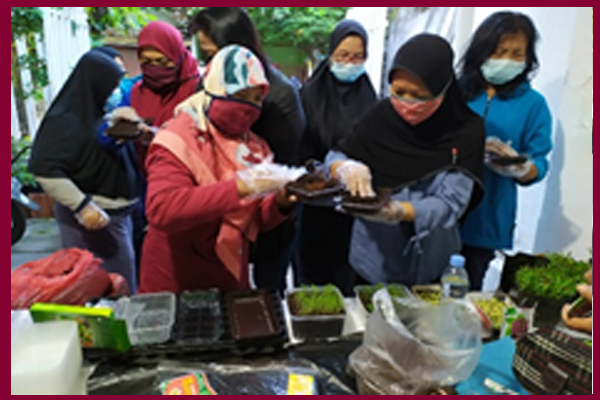BACK STOPPING: CULTIVATION OF HEALTHY VEGETABLES BY USING OF THE ORGANIC WASTE IN URBAN AREAS
DOI:
https://doi.org/10.53067/ije2.v2i1.43Keywords:
Urban Farming, Compost, Organic WasteAbstract
As part of the community that has household activities, this element of society also produces waste in the form of very much waste. Daily food waste and tree leaves are the most dominating among the community, posing a severe problem. One way to minimize the negative impact caused by domestic organic waste is to process the waste by involving the community. Waste management is a systematic, thorough and sustainable activity that includes waste reduction and handling. Waste management needs to be done comprehensively and integrated from upstream to downstream to provide economic benefits, be healthy for the community, and safe for the environment, and change people's behavior. One way to minimize the abundant amount of waste is to use organic waste to make compost. This method of community service implementation uses the participatory society method and the persuasive approach method. As a result of this activity, the community is very enthusiastic about managing organic waste into compost. In addition, people can cultivate vegetable crops at home by using homemade compost media. The community gets a positive value from this activity, namely a clean and healthy environment, and can be an economic value from processing organic waste into compost
Downloads
References
Cundari, L., Arita, S., Komariah, L. N., Agustina, T. E., & Bahrin, D. (2019). Training and assistance in processing organic waste into compost in Burai Village. Journal of Chemical Engineering, 25(1), 5–12.
Ekawandani, N., & Kusuma, A. A. (2018). Composting organic waste (cabbage and banana peel) using EM4. TEDC, 12(1), 38–43.
Harris, Yelianti, U., S. Budiarti, R., & Hakim, N. (2019). Training on making organic compost using the takakura basket method as a solution for handling waste in student boarding houses. DEDICATIONS: Journal of Community Service, 1(1), 1–8.
Jamaluddin, Lulu O., & Fitria. (2021). Minimizing Household Organic Waste Into Compost. Journal of Salingka Abdimas, 1(2), 65–68.
Shitophyta, L. M., Amelia, S., & Jamilatun, S. (2021). Training on Making Compost Fertilizer from Organic Waste at Tirtonirmolo Muhammadiyah Branch, Kasihan, Yogyakarta. Community Development Journal: Journal of Community Service, 2(1), 136–140. https://doi.org/10.31004/cdj.v2i1.1405
Suparyati & Fitrianingsih. (2022). Assistance in Composting as a Waste Management Solution. Journal of ABDIMAS-HIP, 3(1), 51–55.
Valentine, D. A. (2022). Counseling on Minimizing Household Organic Waste Into Liquid Compost. 1(1), 16–19.
Yuningsih, Y., Sumardani, S., & Hani, U. (2020). Community Empowerment through Making Liquid Fertilizer in Wanayasa Village, Purwakarta Regency. Kaibon Abhinaya: Journal of Community Service, 2(2), 90–99. https://doi.org/10.30656/ka.v2i2.2076

Downloads
Published
How to Cite
Issue
Section
License
Copyright (c) 2022 International Journal of Engagement and Empowerment

This work is licensed under a Creative Commons Attribution-NonCommercial-ShareAlike 4.0 International License.















